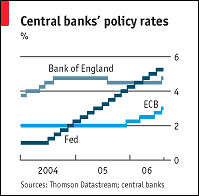The rate of inflation in Nigeria has increased at an alarming pace. It reached 33.9% on a year-onyear basis in October. This is up from 32.7% for September.
It is one of the highest increases in the last few months. This raises questions regarding the drivers behind this trend of inflation and challenges that the economy faces.
On Friday, the National Bureau of Statistics published its latest statistics. The data exceeded analyst’s median expectations by 33.4%.
This surge highlights the pressures that continue to affect Africa’s biggest economy.
Inflation in Nigeria: What is the cause?
A number of factors are interconnected and can cause the sharp increase in inflation, such as a declining currency, higher food costs, or increased fuel prices.
- Currency depreciation: The naira has lost 45% of its value this year, making it the world’s third-worst-performing currency. The naira’s depreciation has increased the price of imported goods, which in turn is fueling an increase in domestic prices.
- Prices of food: Inflation in the food sector rose to 39.2% from 37.8% in October. Food inflation has risen to 39.2% in October, up from 37.8% the previous month.
- Fuel prices: The rising gasoline price, combined with the ongoing removal of subsidies, has added an additional layer of pressure. This in turn, increased transportation costs, which have a direct impact on consumer goods.
Central bank response
At 13 successive monetary policy sessions, the Central Bank of Nigeria has increased interest rates. The policy rate is now 27.25% and was 11.5% until May 2022.
Inflation continues to exceed expectations despite these steps, making it difficult for the bank to maintain prices.
The MPC’s next meeting is scheduled for November 26, and economists are expecting further actions.
The central bank is expected to raise rates by 100 basis points to control inflation, and to achieve real interest rate positives in order to encourage investment.
David Omojomolo is an economist for Capital Economics who specializes in Africa.
The CBN will likely extend the rate-hiking cycle despite its concerns over economic growth, due to the reversal of disinflation.
Challenges both domestic and global
Nigeria’s high inflation is exacerbated both by domestic and external factors:
- Energy prices around the world: Supply chain disruptions, geopolitical tensions are keeping oil prices unstable. Nigeria, as a large importer of petroleum refined, has seen its costs rise, with ripple effects across the entire economy.
- Removal of fuel subsidy: While fiscally responsible, the government’s earlier decision to remove fuel subsidies has led to higher consumer prices.
- Disruptions in supply chains: Inefficiencies and persistent logistical problems in Nigeria’s agricultural sector are driving up the price of food, which accounts for a large portion of Nigerian inflation.
Impact of inflation on the economy
Nigeria’s economy faces risks from the rapid increase in inflation.
Forecasts indicate that the economy will grow by just 0.5% in 2019. Growth projections are only 1.3% for 2025-2026.
Prices are rising, which is affecting the purchasing power of households and can dampen spending by consumers. Consumers are an important driver for economic activity.
The widening of the gap between the inflation rate and the target policy rate – currently about 660 basis point – underscores the challenge for policymakers.
Is relief in sight?
The effects of the fuel price increases and depreciation of the naira will fade in 2024, but any improvement may be gradual and uneven.
Nigeria’s economy continues to be impacted by structural issues, such as a weak infrastructure, uncertainty in policy and the global markets.
The post What is the reason for Nigeria’s rapid inflation? This post may be updated as new information becomes available






